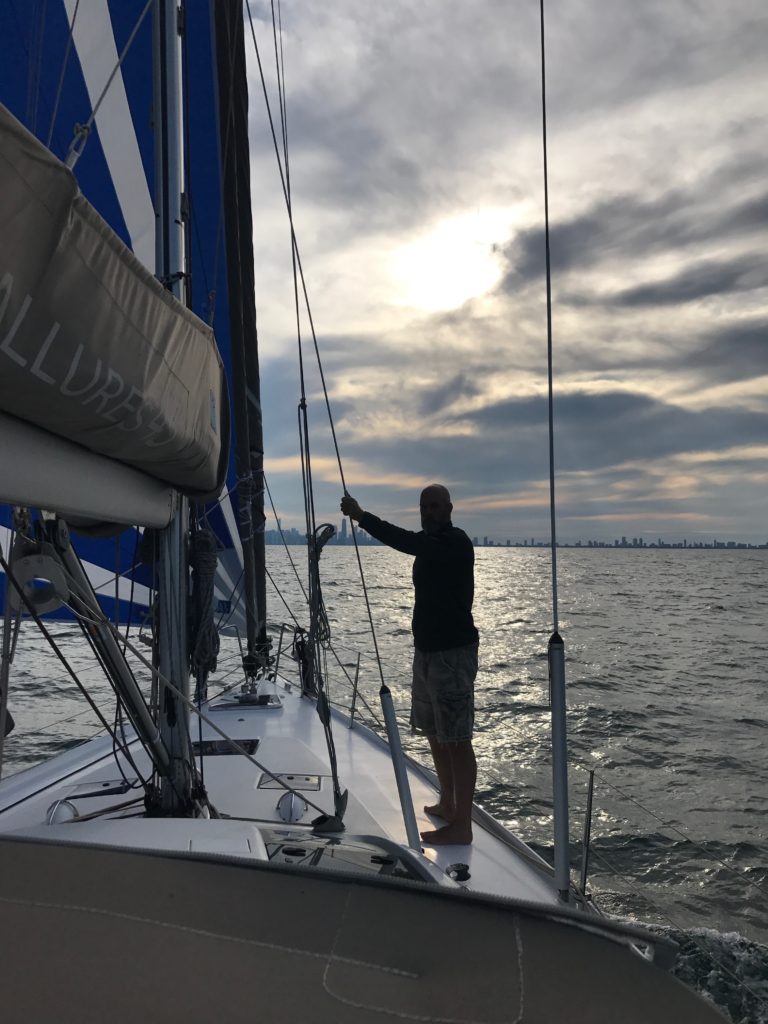
I began sailing late in life. I never sailed as a kid, never crewed nor raced, never had any exposure to sailboats or sailing of any kind.
It wasn’t until my late forties when we decided that instead of building a retirement home on the coast of Maine, that we would instead purchase a cruising sailboat, and thus always have oceanfront property wherever we were. Janet, the practical one in the marriage, accurately stated, “But, you don’t know how to sail”. Me – “I’ll learn” , and this is how we did it. Keep in mind, this was my path, YMMV.
I began with American Sailing Association’s (ASA) certification curriculum, and over a short amount of time I took…
- ASA 101, Basic Keelboat Sailing – I stepped through this two-day course on Lake Michigan, and it was my first time actually on a sailboat
- ASA 103, Basic Coastal Cruising – Traveling to Ft. Lauderdale, I took this and subsequent ASA courses from Blue Water Sailing School
- ASA 104, Bareboat Cruising
- ASA 105, Coastal Navigation – This was a pretty technical course that, over several weeks, I studied for. This course has a pretty dismal first-time pass rate and should not be taken lightly.
- ASA 106, Advanced Coastal Cruising
Modern cruising sailboats can be quite complicated with a myriad of systems onboard that need to be constantly monitored and maintained. There was a lot to learn, so I sought the best resources that I could; targeted courses, books, videos, SMEs and began to tackle each one.
- Diesel Mechanics – We have a Volvo Penta 55 onboard with a very robust diesel fuel system. I poured over schematics, owners technical manuals, Nigel Calder’s Marine Diesel Engines. I talked to my nephew, a professional diesel engine mechanic, and absorbed everything that I could.
- Electronics – This is a personal weakness that needs to be strengthened. I’m still pretty clumsy with a multimeter, but I have poured through Calder’s Boatowners Mechanical and Electrical Manual, as well as Charlie Wing’s Boatowner’s Illustrated Electrical Handbook. I’ve read all of the technical manuals onboard that relate to the various power systems. I’ve learned about marine batteries, smart chargers, inverters, generators, solar panels, wind generators, and how they all work together to keep the boat powered.
- Advanced Sailing Skills – There’s always much, much more to learn. We attended a Parasailor course in St. Petersburg to better understand our massive, winged headsail. I read and reread Lin and Larry Pardey’s seminal book Storm Tactics, Marchaj’s Sail Performance, Hinz’s The Complete Book of Anchoring and Mooring. I’ve poured over every YouTube video ever made on boat handing and docking. Still on the bucket list is ASA’s 118 – Docking Endorsement class. We also set aside times every year to find an isolated spot and practice boat-handling skills.
- Emergency Medicine – As a Paramedic and my wife, the ER physician, I believed that we had this well-covered, but we have a blog post that discusses medical topics. I believe that for a non-practitioner a CPR/AED certification is a necessary first step. After that, I highly encourage taking the EMT-B course. The more illness, trauma and disease that you see, the more comfortable you become with them.
- Weather – There are several books (Dashew’s Marine Weather Handbook), apps (Predict Wind), blogs, and courses available to assist people to better understand maritime weather. At some point I’d like to return to ASA and take its ASA-119, Marine Weather Endorsement as a way of rounding out my overall ASA experience. Aside from that, it’s necessary to be able to read and understand GRIB files, weather patterns, NWS/NOAA reports, etc., and incorporate all of them when planning a passage.
- Communications – As a retired Army Special Forces officer I believed that I had this covered. One of my mentors was an 18E (Special Forces Communications Sergeant), subsequently I was well-schooled in radio and antenna theory. Regardless, it’s important to understand VHF and UHF systems, and HF if you carry that capability as well.
Other skills that I’ve worked on:
- Sewing – Sailrite is by far the best source for marine sewing applications and instruction
- Knots – Have a handful of knots that you can flawlessly tie blindfolded
- Photography, videography and sound – If you plan on multimedia content
- Drone skills – This is a recent FAIL
What’s left to do:
Time on the water is the greatest teacher. After every sail we purposefully review what we did right and what challenged us. How can we be better, safer, more efficient?
USCG Master’s License – This is the goal for this year. I do not plan to use the license commercially, but I believe that the information in invaluable.